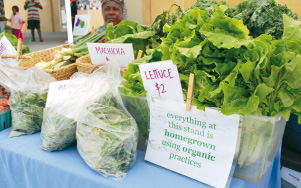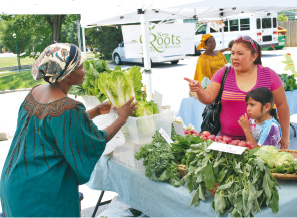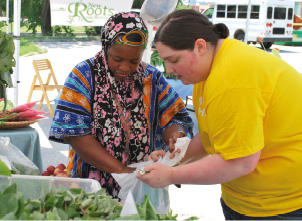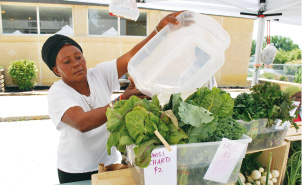
By Leslie Collins
Northeast News
June 22, 2011
Tents dotted the parking lot of Don Bosco’s former charter high school at Garfield and Independence Avenue June 17.
This wasn’t a mini carnival or employment fair. This was the new Northeast Farmers Market.
For the farmers sitting at the tents, this was more than a farmers market featuring locally grown, organic produce. This was a means for surviving in their newfound home, the United States.
Founded by Catholic Charities of Northeast Kansas in partnership with the Kansas City Center for Urban Agriculture, New Roots for Refugees began with a humble community garden in 2005 and in 2008, expanded its mission to include a training farm program for refugees. Currently, 17 refugee farmers are utilizing the 9-acre training farm in Kansas City, Kan., at Juniper Gardens. The goal is to help refugees start their own small business, growing and selling vegetables. Thirty refugees are participating in the community garden program to grow food for their own families.
This year, Don Bosco partnered with New Roots for Refugees to host a farmers market, a first for Don Bosco. Youth from Don Bosco’s Youth Development Center created a marketing plan for the Northeast Farmers Market as part of their community service project.
“It’s been hard to grasp because they’ve (youth) never really had to do a marketing plan or start something from scratch,” said Val Salazar, director of Don Bosco’s youth center. “We’ve had to plant that seed in their mind about what it is to build a logo, what does it mean to these farmers that sell these crops, where does this food come from?”
During the second semester of school, Don Bosco youth watched a documentary about two 11 and 12-year-old girls living in New York City who became “food pioneers” in their community by encouraging residents to find out where their food comes from and ensuring the community has access to healthy foods.
“This farmers market is one of the first steps we can do in becoming pioneers in our community,” Salazar said.
To promote the farmers market, Don Bosco youth designed and distributed fliers, made signs and personally invited people to come. During the next farmers market, they plan to dress in vegetable and fruit costumes and stand on the corner of Garfield and Independence Avenue.
In April, the youth met with the farmers, learning about their culture.
“It was cool,” said eighth grader Lalo Moreno. “We asked them questions like what plants or vegetables they grow, where they’re from, stuff they like to do. It’s interesting. A lot of cultures are very different.”
Eighth grader Fabian Rascon said the farmers market not only helps the refugees, it’s providing healthy, organic produce to Northeast residents.
“This is a good opportunity for them (Northeast residents) to realize there’s good and healthy food. People should come out and try it,” Rascon said.
More on New Roots
“It’s a great program. I think it benefits everyone,” said Rachel Pollock, New Roots for Refugees program coordinator.
Although the program is open to both men and women refugees, the program is mostly comprised of women.
“A lot of that is because in the cultures where these folks come from there’s a lot of women involved in agriculture in those countries. So, it seems like a natural fit,” Pollock said.
The year-round program includes English as a second language classes; workshops on farming and starting up a small business; planting seeds and working in the fields.
“I like that it (program) focuses on the strengths of the folks. For a lot of these people, it’s hard. Their English is limited. They don’t have a lot of education. So, this program focuses on their strengths, which is agriculture and their experience.”
During the first year a refugee is in the program, New Roots will pay for all costs, including seeds, water, farmers market booth fees and other necessities. The second year, the farmer pays for seeds, the third year the farmer pays for seeds and water, and the fourth year, the farmer pays for water, seeds and the cost for selling at a farmers market. After each farmers market, New Roots requires each farmer to place 20 percent of his or her sale revenue into a personal savings account to pay for the cost of running a small business. New Roots hopes farmers will establish a customer base at farmers markets and eventually feel comfortable selling on their own.
This year, New Roots is helping four farmers search for their own land to buy.
“It’s kind of magical helping people who are new to the United States purchase their own property here, hear them talk about their dreams and see it come to reality,” Pollock said.
New Roots for Refugees currently sells its produce at eight area farmers markets, including Northeast Farmers Market. Northeast Farmers Market will be held every Friday from 11 a.m. to approximately 3 p.m. SNAP and debit cards will be accepted.
“It’s just been such a great experience thus far,” Salazar said. “The interaction with the farmers, the community and their excitement to be in the Northeast is just the best.”



















